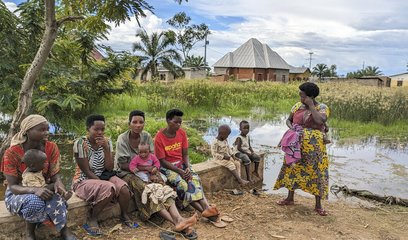-
1.2 Million
1.2 million people suffer from food insecurity
-
392 deaths
Maternal mortality stands at 392 deaths per 100,000 live births
-
85 %
85% of the population works in agriculture
Burundi: Key facts
- Population: 14.4 Million
- People in need: 600,400
- GDP: US$7.03 Billion
- HDI: Ranked 187/193
The CARE Crisis Report has been published for 10 years, and Burundi has appeared on the list of crises overlooked by the global media nine times. The landlocked Great Lakes nation is facing extreme weather events, political unrest, and a massive influx of refugees. People are fleeing to Burundi from the neighboring Democratic Republic of Congo (DRC) to escape extreme violence. In October 2025, more than 110,000 refugees and asylum seekers arrived in Burundi from DRC.
But even after fleeing they face a difficult everyday life, as Burundian communities and authorities with limited resources of their own struggle to cope with providing more than just sanctuary for their desperate neighbors. “We can’t afford two meals a day,” reports Enock, who lives with his family in a refugee camp in southwestern Burundi. In total, more than 1.2 million people in the country are affected by food insecurity.
Reproductive health: the key to independence
For women and girls in the country, the already precarious situation is further exacerbated: domestic violence, child marriage, early pregnancy, inadequate access to contraception, and almost complete responsibility for housework and caregiving threaten their physical and economic security.
“Because of my pregnancies in quick succession, I was often ill. I couldn’t work or take proper care of my children,” says Chantal, a participant in a CARE-supported project on sexual and reproductive health.
In Burundi, the birth rate is 4.67 children per woman. If pregnancies follow too closely together, the risk of serious health problems increases because the mother’s body cannot recover sufficiently from the previous birth.
“Reproductive health plays a key role in our economic independence,” reports Evelyne, a member of a savings group in Burundi. “I have three children, each born five years apart – thanks to family planning and the advice I received from CARE’s partner organizations such as ABUBEF, SaCoDe, and Yezu Mwiza. This spacing allowed me to work, save, and build up my own income.”
Women empower women
Women are also disadvantaged in other areas like inheritance law, access to credit, and agriculture, even though this is the main source of income for 85% of the population. Local women-led organisations are therefore extremely important. Their expertise is crucial for identifying needs and driving sustainable change.
“By working with local women’s organisations, we strengthen local communities and social cohesion, to allow them to access economic incomes and opportunities as they can,” says Josée Ntabahungu, Country Director of CARE Burundi.
CARE in Burundi
CARE has been working in Burundi since 1994 and, together with local partner organisations, is committed to ensuring that women and girls receive protection and support and can shape their own futures. The projects focus on strengthening equality, women’s economic participation, the prevention of violence against women and girls, and sexual and reproductive health.
How can I help people in Burundi?
Donate now to support CARE's life-saving work in Burundi and around the world. Together, we can help to transform lives across the globe.
Your donation could help provide life-saving aid when disaster strikes, and give women and their communities the resources and opportunities they need to survive and thrive.
Ten forgotten crises
The CARE Crisis Report is published annually and highlights the ten crises that receive the least media attention. In 2025 Burundi ranked as the eighth least reported crisis in the world.
